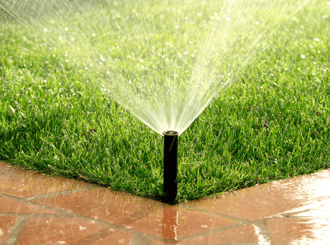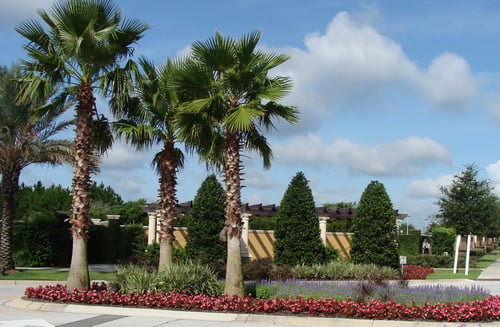
Home / Here on Earth / Landscape Tips & Tricks: Winter Plant Protection
Florida may have the warmest winter in any state, but that doesn’t mean you’re off the hook when it comes to winter plant protection. With temperatures that can drop below 30 degrees Fahrenheit and just as quickly rise to 80 degrees Fahrenheit, your plants experience extreme shifts that can cause irreversible damage.
Many of Florida’s native plant species are susceptible to frost damage, and even cold-hardy plants can suffer if not protected. While frost may not immediately kill your plants, it weakens and disrupts their natural processes, impacting their growth and health for months to come.
At the same time, a one size fits all approach can be just as detrimental to your greenery. Here we’ll cover some useful tips and tricks for winter protection, but this isn’t a comprehensive guide. Make sure to customize your winter protection plan to take your specific landscape into account.-1.jpg?width=420&height=312&name=DTEL-%20Blog%20(1)-1.jpg)
Stay Up to Date with Weather Alerts
Floridians are well aware of how rapidly and dramatically the weather can change, so the first and the most important thing is to stay up to date. Monitoring local weather is vital as the size of Florida means drastic differences in climate.
Cities like Tallahassee and Jacksonville can quickly drop below 30 degrees, and at the same time, Naples may be at 80 degrees with thunderstorms. Staying ahead of major weather shifts can prevent you from scrambling and your plants from suffering.

Winter Watering
There is a common misconception that when temperatures drop, plants stop soaking up water and that any excess will frost or damage roots. While they may not require as much water as during the summer months, they still need a certain amount of water to survive the winter without losing color or growing brittle.
Adjusting your irrigation system to suit your plants’ needs for the winter is essential. If the system is kept the same as in summer, it can lead to overwatering, which will damage the plants as excess water will suffocate the roots.
-1.jpg?width=330&height=245&name=DTEL-%20Blog%20(2)-1.jpg)
Cover Plants When Temperatures Drop
Just like a comfy sweater helps keep you warm, a covering can keep your plants’ exterior safe from frost. Most tropical plants are in danger if the temperature drops below 50 degrees Fahrenheit. Investing in a frost cover would be your best bet to protect your plants. Ensure that the covering is kept loose around the plant to protect the tender leaves and delicate stems and is securely fastened to the ground to trap heat.
Avoid using coverings made of plastics. Plastic covers will cause condensation to form on the leaves, which can quickly refreeze, making it colder under the plastic cover than actual frost.
Insulate Roots with Mulch.png?width=330&height=245&name=DTEL%20-%20Blog%20(1).png)
Winters in Florida are rough. On one hand there is significantly less rain, making the weather dry and on the other hand there might be spells of flash freezes. But don’t worry, here’s the good news - we have Mulch! A good layer of mulch will help retain the soil’s moisture and protect the roots against frost.
Another benefit of mulching is that it does not allow weeds to grow because it blocks the sunlight necessary for them to sprout. Thus, the weeds do not use the soil nutrients. They are retained for your precious plants.
Three to four inches of straw, pine needles, leaves, or other light non-compacting materials will provide excellent cover.
Pruning your Plants
-1.jpg?width=330&height=245&name=DTEL-%20Blog%20(4)-1.jpg)
Late Florida winter is a good time to prune your plants because the colder weather makes the plants go into a dormant mode. Cutting or pruning during this period will allow your plants to grow denser and healthier when spring comes.
A word of caution though - do careful research on the kinds of plants you have before you start pruning as different plants have different needs.
Keeping a landscape map with the names of the species of your plants helps with this. If you have a landscape professional, they should already have this handy, but If not, you may want to hire one to identify your plant species.
This will prevent hasty planning and incorrect care and can be adjusted in flux with changes to your landscape.
Get Advice from an Arborist, Horticulturist, or Landscape Professional
Professional advice will help guide you through the more complex bits of preparing for winter, like checking your irrigation systems for leaks and helping make sure that all your plants survive the winter. Typically, these companies provide free evaluations and are trained to inspect, prepare, and maintain any landscape. Involving a professional in the process guarantees that the job will be done right the first time.
Down To Earth Landscape & Irrigation boasts of a 30-year track record in providing services that exceed client expectations. We proudly serve in multiple regions of Florida and specialize in commercial, residential, and resort services. If you have questions about our landscaping services, don't hesitate to contact us.

Conclusion
You may think winter protection is unnecessary, but since 2018, Florida has been experiencing some of its coldest winters yet, with South Florida even experiencing snow flurries. These landscaping tips and tricks help address some of the most prevalent threats to Florida landscapes but remember this isn’t your complete guide to winter maintenance.
Make sure you stay ready for whatever winter brings your way, and you’ll keep a lush landscape through all four seasons.

-1.jpg?width=330&height=245&name=DTEL-%20Blog%20(3)-1.jpg)
